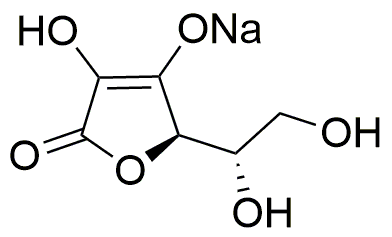(+)-Sodium L-ascorbate is widely utilized in research focused on:
- Food Preservation: This compound acts as a powerful antioxidant, helping to extend the shelf life of various food products by preventing oxidation. It is commonly used in processed foods and beverages to maintain freshness and color.
- Cosmetic Formulations: In the beauty industry, it is incorporated into skincare products for its skin-brightening properties and ability to protect against environmental damage. Its gentle nature makes it suitable for sensitive skin formulations.
- Pharmaceuticals: This compound is often used in vitamin supplements and medications due to its role as a stable source of Vitamin C. It supports immune function and overall health, making it a popular choice in dietary supplements.
- Research Applications: In laboratory settings, it serves as a reducing agent and stabilizer in various biochemical assays, aiding in the study of oxidative stress and cellular functions.
- Agriculture: It is applied in agricultural practices as a plant growth enhancer. Its antioxidant properties can improve plant resilience against stress, leading to better crop yields and quality.
General Information
Properties
Safety and Regulations
Applications
(+)-Sodium L-ascorbate is widely utilized in research focused on:
- Food Preservation: This compound acts as a powerful antioxidant, helping to extend the shelf life of various food products by preventing oxidation. It is commonly used in processed foods and beverages to maintain freshness and color.
- Cosmetic Formulations: In the beauty industry, it is incorporated into skincare products for its skin-brightening properties and ability to protect against environmental damage. Its gentle nature makes it suitable for sensitive skin formulations.
- Pharmaceuticals: This compound is often used in vitamin supplements and medications due to its role as a stable source of Vitamin C. It supports immune function and overall health, making it a popular choice in dietary supplements.
- Research Applications: In laboratory settings, it serves as a reducing agent and stabilizer in various biochemical assays, aiding in the study of oxidative stress and cellular functions.
- Agriculture: It is applied in agricultural practices as a plant growth enhancer. Its antioxidant properties can improve plant resilience against stress, leading to better crop yields and quality.
Documents
Safety Data Sheets (SDS)
The SDS provides comprehensive safety information on handling, storage, and disposal of the product.
Product Specification (PS)
The PS provides a comprehensive breakdown of the product’s properties, including chemical composition, physical state, purity, and storage requirements. It also details acceptable quality ranges and the product's intended applications.
Certificates of Analysis (COA)
Search for Certificates of Analysis (COA) by entering the products Lot Number. Lot and Batch Numbers can be found on a product’s label following the words ‘Lot’ or ‘Batch’.
Número de catálogo
Número de lote/lote
Certificates Of Origin (COO)
This COO confirms the country where the product was manufactured, and also details the materials and components used in it and whether it is derived from natural, synthetic, or other specific sources. This certificate may be required for customs, trade, and regulatory compliance.
Número de catálogo
Número de lote/lote
Safety Data Sheets (SDS)
The SDS provides comprehensive safety information on handling, storage, and disposal of the product.
DownloadProduct Specification (PS)
The PS provides a comprehensive breakdown of the product’s properties, including chemical composition, physical state, purity, and storage requirements. It also details acceptable quality ranges and the product's intended applications.
DownloadCertificates of Analysis (COA)
Search for Certificates of Analysis (COA) by entering the products Lot Number. Lot and Batch Numbers can be found on a product’s label following the words ‘Lot’ or ‘Batch’.
Número de catálogo
Número de lote/lote
Certificates Of Origin (COO)
This COO confirms the country where the product was manufactured, and also details the materials and components used in it and whether it is derived from natural, synthetic, or other specific sources. This certificate may be required for customs, trade, and regulatory compliance.


